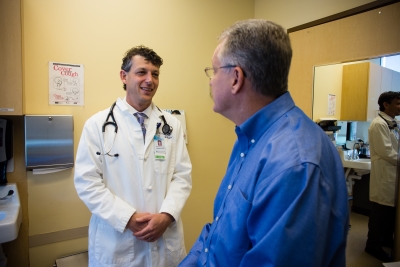Dr. Ben Keidan on Finding Joy Through Listening
- Category: General, About Us, Patients & Visitors, Primary Care
- Posted On:
- Written By: Boulder Community Health
Boulder Community Health has launched a a system-wide initiative called “BCH Listens: Every Person, Every Time” — an opportunity for personal and professional growth centered on refining our communication skills.
Active listening is good medicine — research shows that providing treatment within an emotionally supportive environment improves patient outcomes. It's also been shown that caregivers who create real emotional connections with their patients and their colleagues experience much deeper job satisfaction. Learn more at bch.org/BCHListens.
For me, listening goes back to the beginning when I first decided to go to medical school. I wanted to connect with people and help them get better when they were sick and also help them them thrive when they are well.
But throughout medical training and residency and sleep deprivation, there is a focus on the head the cognitive, i.e.what’s the diagnosis, what’s the treatment, and sometimes the listening and the empathy can start to fall away.
As a physician, I found myself feeling a bit burned out and a bit less impactful -- ike people weren’t responding to that kind of approach. That’s where I really started looking at listening to improve outcomes in patients but also improve my joy in work. The health care industry has a crisis where people are really feeling burned out and struggling with enjoyment and not loving their work. Really focusing on listening is good for patients but it’s also good for providers and staff.
There is tremendous evidence that as you connect better with people they tend to follow instructions, do what’s best for them, make healthy changes that are best for them more effectively. A mentor of mine once said, "No one cares how much you know until they know how much you care.”
 Whenever possible I try to before going in the room just take two deep breaths and clear my mind of whatever was going on the last visit or the last phone call so that I can really focus on that next person.
Whenever possible I try to before going in the room just take two deep breaths and clear my mind of whatever was going on the last visit or the last phone call so that I can really focus on that next person.
When we hear the comments from patients about really good experiences they’re often, "the front desk person took an extra minute to listen" or "the medical assistant really took the time to listen." It’s transformational.
The most exciting part of working on listening and communication with empathy is that it very quickly, within days, started to reinvigorate the way I started to see patients, the way I looked forward to work, and the outcomes that I was getting. Almost immediately I started hearing feedback, "I really noticed you were paying attention” and, "thank you for spending time listening, that was really helpful."
Learn more at bch.org/BCHListens.